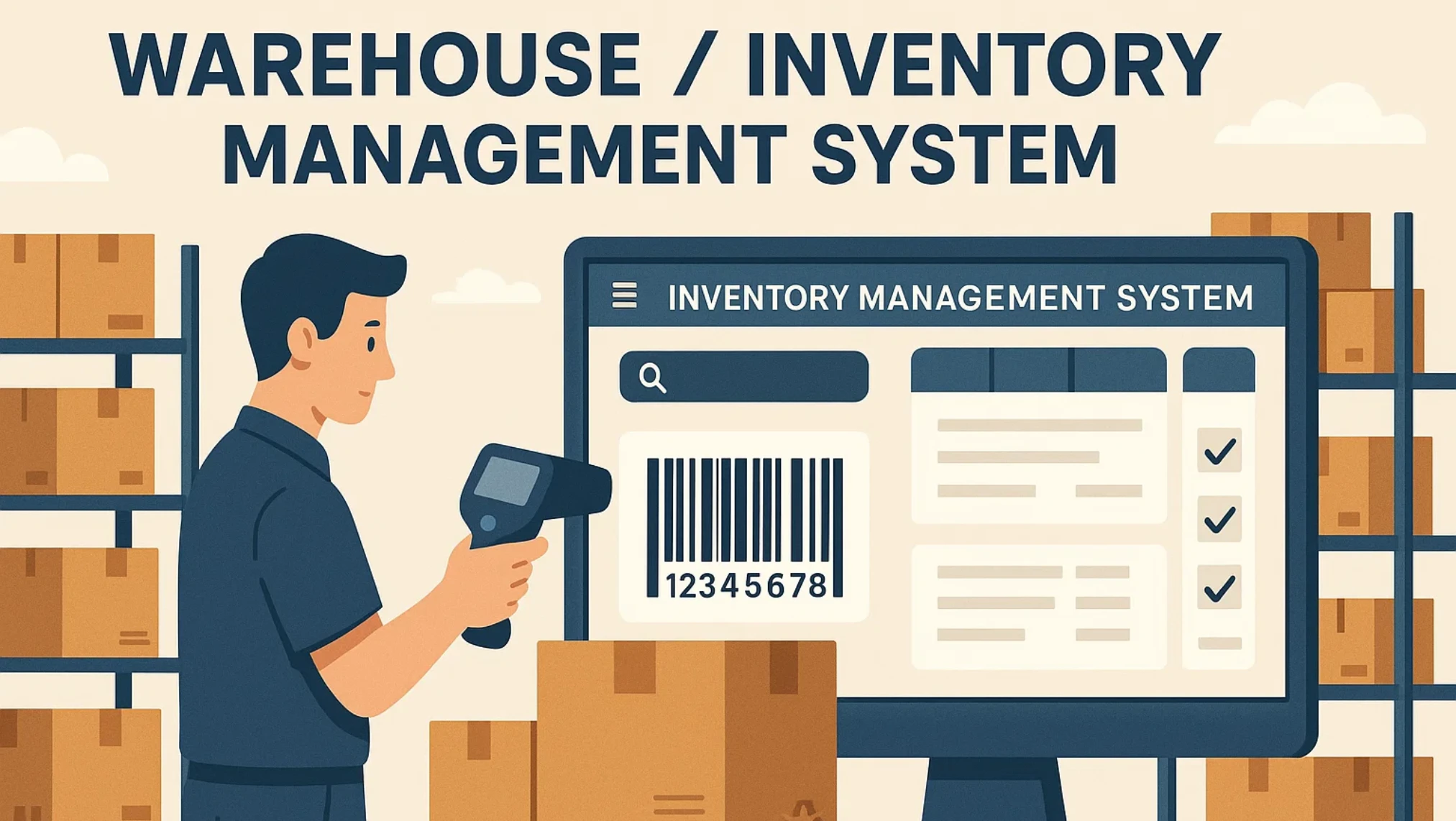Warehouse management is the process of efficiently controlling the storage, movement, and tracking of goods within a warehouse. It involves a combination of strategies, technologies, and best practices that ensure inventory is accurately recorded and easily accessible when needed. A well-designed Warehouse Management System (WMS) automates core tasks like receiving, storing, picking, packing, and shipping—streamlining daily operations. With tools like barcode scanners, RFID, and IoT sensors, a WMS provides real-time visibility into inventory levels, locations, and movement history. This helps warehouse managers stay informed and make timely decisions to keep operations smooth and service quality high.
Benefits of Warehouse Management System
Warehouse Management System has become an instrumental component in modern-day supply chain operations. From the very beginning to the end of the operations, it ensures smooth coordination across multiple departments. Find the key benefits of employing a WMS below:
Better Inventory Accuracy: A WMS can help reduce the manual data entry errors and discrepancies through the automation of data acquisition. This guarantees that the stock count remains precise.
Increased Operational Efficiency: Automated workflows and optimized operational procedures help in minimizing physical efforts, time, and labor costs while providing improved output performance.
Cost Efficiency: Enhanced space utilization due to better and active stock management eliminates both carrying costs and overstock scenarios.
Improved Scalability: The introduction of cloud-based WMS solutions now enables businesses to grow and scale higher without the need for major infrastructure investments and developments.
Regulatory Compliance: Active surveillance, automated records, and audit trails ensure that all the operations and procedures remain compliant with the industry-set regulations and standards.
The Use of a Warehouse Management System
A Warehouse Management System is the perfect tool for enforcing complete coordination and automation of each and every step involved in warehouse operations. Key uses of an inventory management system include:
Stock Acceptance: By automating the verification of incoming goods, a WMS cross-checks them against the purchase orders to direct them accurately towards the appropriate storage locations.
Tracking Inventory: By employing technologies such as RFID or barcode to track product movements, a WMS enables cycle counting to keep the stock records accurate while also providing live inventory updates.
Order Fulfillment: With precise batch packing, wave picking, and zone picking, a WMS optimizes order processing operations and extensively reduces fulfillment times to keep the customers satisfied and happy.
Workforce Management: With a WMS, you can rely on the proper monitoring of workforce productivity to assign tasks based on real-time workloads. This also allows for efficient forecasting of labor requirements.
Reporting: With complete overseeing capabilities, a WMS can generate accurate performance metrics for continuous improvement, such as order accuracy, dock-to-stock time, picking throughput, and more.
AI in Warehouse Management
As Artificial Intelligence (AI) continues to make its way through multifarious industries, it is also transforming how warehouses are managed. Let us take a look at how AI can help in improving WMS procedures:
Automated Scheduling: AI-driven scheduling can help by assigning pickers and packers work in real time. This ensures efficient balancing of workloads while reducing idle time.
Demand Forecasting: AI utilizes machine learning to learn and analyze historical sales data, seasonal data, and other external factors involved to predict inventory demands accurately.
Smarter Inventory Layout: By utilizing real-time data, AI recommends the ideal product placements depending on the order frequency, product dimensions, and inbound/outbound flows to minimize travel distances.
Irregularity Detection: With smart monitoring, the detection of anomalies in stock movements such as product misplacement or worn-out products become easy.
Industries Warehouse Management System is Apt
As Warehouse Management System continues to grow as a standard across multiple industries, the industries that severely require the need for a WMS for improved efficiency, accuracy, and scalability are as follows:
E-Commerce and Retail Industry: E-Commerce and Retail businesses have a rapidly changing product range that comes with high order volumes and frequent promotions. A WMS can help by providing fast and accurate order fulfillment duties with real-time stock updates to ensure that all customer expectations are met.
Manufacturing Industry: Today’s manufacturers follow tight schedules, utilizing just-in-time production models that rely on inventory availability. A WMS can guarantee proper material availability between production lines and warehouses to minimize downtimes and reduce unwanted inventory overflow.
Food and Beverage Industry: Managing goods with expiry dates is a complex process due to the short shelf life as well as the regulatory compliance requirements. A WMS can enhance this optimization by employing FEFO (first expiry, first out), real-time temperature tracking, and track each batch appropriately to reduce wastes.
Pharmaceuticals and Healthcare Industry: A mistake in this industry can cost someone’s life! Hence, a WMS ensures strict compliance with government regulations and standards by facilitating proper tracking, expiry monitoring, and audit trails for tracking details and acquiring data for all the drugs involved.
Automotive and Aerospace Industry: These industries deal with complex assemblies and long wait times for high-value parts. A WMS ensures that a vendor is managed appropriately for tight coordination between suppliers and production.
Types of Warehouse Management Systems
Depending on the scale, architecture, and specialization, the warehouse management systems can be classified into several types, some of the main ones being:
Standalone WMS: Comprises on-site software dedicated to warehouse operations. They offer in-depth functionality but require assistance from local IT support.
Modular WMS: Modular WMS is a component-based system where businesses can select modules based on their specific requirements, such as labor management or yard management.
Cloud-Based WMS: Are hosted solutions that provide rapid deployment, regular updates, and lower upfront costs. This makes cloud-based WMS the ideal option for dynamic and fast-paced operations.
Integrated ERP-WMS: Includes warehouse modules embedded within Enterprise Resource Planning (ERP) systems, facilitating seamless data flow across finance, procurement, and sales.
Mobile WMS: Mobile WMS includes applications designed for smartphones and tablets that offer real-time task execution and scan-based operations on the go.
Choosing the best Inventory Management System for your Warehouse
If you are searching for a reliable and efficient Warehouse management Solution in UAE, Business Experts MEA LLC offers an AI-Powered Warehouse Management System that guarantees functionality, scalability, ease of integration, and vendor expertise.
BEMEA’s AI Warehouse Management system stands out due to:
Advanced AI Capabilities: BEMEA’s Advanced AI utilizes machine learning for demand forecasting, dynamic slotting, and anomaly detection.
Regional Expertise: Tailored to the UAE market, addressing local regulations, compliance, language support, and regional logistics requirements.
Extensive Scalability: With cloud-native design, it supports rapid scale-up during peak seasons without performance degradation or need for further infrastructure.
Around-the-Clock Support: Offers 24/7 local customer service, training programs, and dedicated implementation teams for smooth onboarding and guaranteed productivity.
Reporting and Analytics: Acquire more detailed insights and data by tracking KPIs, inventory trends, and warehouse efficiency factors to optimize and plan business operations properly.
Additionally, BEMEA’s AI Warehouse Management Solution’s integration is possible with Microsoft Dynamics 365 Finance and Operations as well as Business Central, ensuring that all the industries acquire seamless flow between their warehouse procedures and comprehensive business processes.Installation of the Modules (D365 F&0 or D365 BC) will be based on the clients requirement and company.










